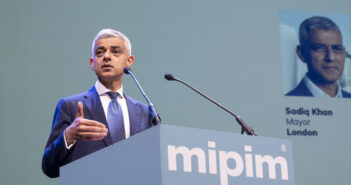Mayor of Los Angeles, Eric Garcetti, the new Chair-Elect of the C40 cities climate leadership group, sees “ecological devastation” and “economic dislocation” as the two, intertwined challenges of our time.
For Garcetti, the answer to these challenges lies with cities. “Cities build economies, cities protect their people, and cities can collectively save the earth,” he wrote last week in a statement.
This comes at a time when the world’s mega-cities are getting bigger. Some are even bigger than many countries. Cities are the world’s new power brokers.
At the closed-door Political Leaders Summit held this March at MIPIM in Cannes, the room echoed to calls for joint partnership between all stakeholders – local government, the private sector, community organisations, residents – to create a holistic solution to the challenges faced by urban areas.
“Physical risk is one key factor for investors to analyse, but it is critical that they look at … which city authorities are showing the leadership, resourcefulness and innovation needed to tackle the issues that are fast emerging” – David Hutchings, Cushman & Wakefield
“Physical risk is obviously one key factor for investors to analyse, but it is also critical that they look at the institutional and political response to this risk: in particular which city authorities are showing the leadership, resourcefulness and innovation needed to tackle the issues that are fast emerging,” said David Hutchings, Head of Investment Strategy, EMEA Capital Markets, Cushman & Wakefield.
The Cushman & Wakefield report Winning in Growth Cities, released this October, quotes academic research as suggesting that local and central government play different roles in “adaptation activities”.
Local government, says the report, delivers “direct adaptation (management, planning, policy, and practice and behaviour functions)”, while central government delivers “the policy needed to create a supportive environment”.
As one of the report’s case studies on the effects of climate change, Cushman & Wakefield looked at Greater Tokyo, where half of the population live on an alluvial floodplain. As a protection from flooding, this urban area – the largest in the world – is building 3.3 million cubic metres of reservoirs, as well as underground tunnels, artificial wetlands and designated ‘disaster prevention parks’.
The world’s major cities launch the Global Green New Deal
As Mayor Garcetti wrote: “From Seattle to Seoul, cities are imagining this economic and ecological marriage at the national level.”
For the United Nations, it is about tackling the 17 Sustainable Development Goals (SDGs) adopted by UN member countries in 2015. Many cities have used the SDGs as a template for their own strategic plans, including Copenhagen’s The Capital of Sustainable Development and New York City’s OneNYC 2050.
This October, the C40 World Mayors Summit in Copenhagen launched the Global Green New Deal. Earlier in the year, in the US, Representative Alexandria Ocasio-Cortez and Senator Ed Markety had introduced a congressional resolution for a Green New Deal, inspired by President Franklin D Roosevelt’s New Deal programme of the 1930s.
The UK’s combined authorities – working as a group of cities and towns
At the MIPIM Political Leaders Summit, the benefit of “working together” was a consistent theme, reflecting the saying by Japanese poet Ryunosuke Satoro: “Individually, we are one drop. Together we are an ocean”. There were also calls for more power to be passed from national governments to cities and to groups of cities and towns.
In the UK, for example, England has ten ‘combined authorities’, grouping together city and town councils. The aim of the combined authorities is to boost regional economic growth. Given the intrinsic link with the economy, climate change is also on the agenda.
“The value of devolution is there for all to see” – Andy Street, West Midlands Combined Authority
Responding to the announcement this September that the UK Government would introduce an English Devolution White Paper, Andy Street , the Mayor of West Midlands Combined Authority, said: “The value of devolution is there for all to see. In the West Midlands we are seeing record economic growth, record house building, record investment in our public transport, and record numbers in work.”
The three pillars – market, state and community
For Raghuram Rajan, University of Chicago professor, former IMF chief economist and head of India’s central bank, and author of The Third Pillar, the answer to creating a more prosperous future is to achieve a balance between the “three pillars” of society – the market, the state and the community.
The power of the community is that it “anchors the individual in real human networks and gives them a sense of identity” – Raghuram Rajan, author.
For too long, he writes, the focus has been on the market and the state, at the cost of community. To rebalance this triangle, he calls for more “powers, spending and activities in the community”. The power of the community, Rajan writes, is that it “anchors the individual in real human networks and gives them a sense of identity”.
In a move to rebalance this triangle, and in a first of its kind in the UK, the city of Bristol – whose Mayor, Marvin Rees, was a speaker at MIPIM 2019 – launched City Funds this autumn as part of a vision to build a “fair social foundation within sustainable environmental boundaries” by bringing together the private (market) and public (state) sectors with community organisations.
Cities as a “mould” for society
The opening speaker at the MIPIM Political Leaders Summit in Cannes – attended by 35 of the world’s top mayors and political leaders – was Chris Williams, Director, UN-Habitat. He saw cities acting together as “systems of cities” and working with national governments.
Linked to the issues of climate change and inequality, the Summit gave widespread recognition to the global housing crisis, and that to meet housing targets city authorities needed to work with the private sector.
With high house prices – for rent and sale – especially in gateway cities, several mayors at the MIPIM Summit voiced concerns about the need to protect private sector tenants and the risks of disenfranchising a whole generation from wealth and asset ownership.
“If you have a flawed mould, you will have a dysfunctional society; if you create a beautifully crafted mould, you have a better chance of having a beautiful society” – Neal Gorneflo, Shareable
Also taking part at the MIPIM Political Leaders Summit was Neal Gorenflo, Executive Director, Shareable, a non-profit organisation based in California. He told the audience: “You can look at cities as a mould for society. If you have a flawed mould, you will have a dysfunctional society; if you create a beautifully crafted mould – which citizens participate in and make with you – you have a better chance of having a beautiful society.”
“A city should be something that everyone has a stake in, some control over, and that they care for and get benefit from” – Neal Gorenflo, Shareable
Gorenflo, editor of Sharing Cities: Activating the Urban Commons, talked about the need for the city as a ‘commons’, belonging to the whole community. “A city should be something that everyone has a stake in, some control over, and that they care for and get benefit from,” he explained. Rajan would see this as the need to have an equal balance between the market, the state and community – the three pillars.
The MIPIM Political Leaders Summit 2020 takes place on 10-11 March.



